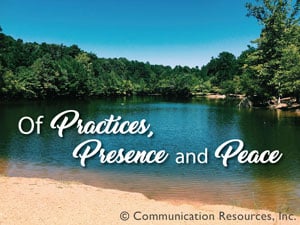Of Practices, Presence and Peace

This month’s guest writer is the Rev. Dr. Rob Apgar-Taylor.
When it was evening on that day, the first day of the week, and the doors of the house where the disciples had met were locked for fear of the Jewish authorities, Jesus came and stood among them and said, “Peace be with you.” After he said this, he showed them his hands and his side. Then the disciples rejoiced when they saw the Lord.
—John 20:19-20
I think we are in what … week number 734 of this difficult time? Holed up with fear? Some have to venture out to get supplies or make a living, but many of us are just locked away, hoping we and those we love are okay. But we need (or at least I need) to be reminded of what gives us much-needed peace to see us through. It’s the gift that our spiritual tradition calls mindfulness. Mindfulness is “a mental state achieved by focusing one’s awareness on the present moment, while calmly acknowledging and accepting one’s feelings, thoughts, and bodily sensations” (Oxford English Dictionary).
Mindfulness is a spiritual practice. It is training ourselves to be able to stop and discern what is happening around us in any given moment. Mindfulness is the way we train our minds to be attuned to how we are really feeling … to what’s really happening in our bodies, our spirits and our surroundings so that when those disturbing emotions (anger, jealousy, fear, anxiety and the like) start to show their ugly faces, we can recognize them for what they are and find peace. Instead of reacting and being stuck in that reaction, we can find the clarity to stop. We can ask ourselves: “What’s really going on here? Why do I feel the way I do? Why am I reacting this way?” And then we can deal with those disturbing emotions and return to peace.
Sounds good right? But it’s tough. It’s a spiritual practice, and it’s hard work. Like learning to run a marathon or play an instrument, it’s something we get better at the more we practice. The disciples spent three years in training. They learned to be attuned to his voice, his presence, his peace. What we see in this story is paralyzing fear and anxiety giving way to peace through an encounter with the Holy.
So how do we get there? Not accidentally. We don’t accidentally come to a state of heightened mindfulness any more than we accidentally become a concert pianist. It’s intentional; it’s methodical. And as a pastor I would say it’s absolutely essential. For me, it’s time in meditation and prayer. Ten or 15 minutes lighting a candle, in quiet reflection. No words, no thoughts, just focusing on quieting my mind so that God can speak. But that doesn’t happen for me if I never stop and listen. It never happens if I don’t turn off the TV, the music, the world around me. I have to make that conscious decision to go into the room, light the candle, sit on my meditation mat and listen.
I remember a pastor teaching a now very silly and trite example when I was a kid, but it does hold some truth. “The Holy Spirit is a Gentleman (sic)” he said. “The Spirit is not going to force itself on you. You need to invite it.” Now, I’m not sure this squares completely with the Pentecost story, but there is a point here. True lasting peace — the peace that only comes from the Divine — is not forced on us. It’s something we have to invite. And we do that by developing spiritual practices that foster mindfulness.
Prayer, quiet time, reading Scripture or other devotional texts, listening to music, writing poetry, or even getting our hands dirty in clay or paint or garden dirt. We may all have different ways of getting there … but getting there is the point. Perhaps now more than ever! As faith leaders, we need to teach our people and create opportunities for them to experience a variety of spiritual practices in safe, non-threatening ways. Our practices won’t all be the same, but by offering opportunities for people to try new things, they may find new ways to connect to Christ. And in this time, can there be any more important job for us who lead the church?
Like the disciples, we can either live locked away in fear and anxiety of what the future holds, or we can look for ways to see and hear divine peace standing in our midst … calling us to hope for another day.
Share this Post:
Looking for More?
Imagine having fresh help in preparing your sermons right at your fingertips, especially during those weeks when your words and ideas are not flowing easily. Homiletics Online won’t write the sermon for you but once you’ve used this treasury of solid content, you’ll wonder how you ever got along without it.
Would you like to see your post on this blog?
We are always looking for talented and passionate writers who want to share their ideas on preaching the Gospel. If that sounds like you, then please use the button to submit a guest post.

